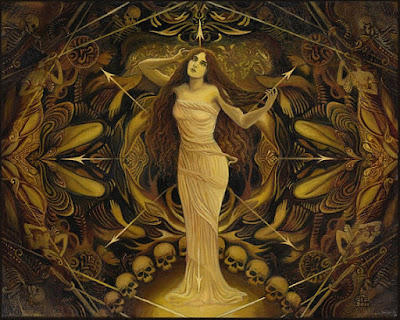Eris was the Greek goddess of chaos, strife and discord. She was the daughter of Zeus and Hera; according to other myths, she was the daughter of Nyx (dark night) alone. Her opposite was Harmonia. The equivalent Roman goddesses of Eris and Harmonia were Discordia and Concordia. She had a son, Strife, whom she brought along with her when she rode her chariot to war alongside Aris.
Eris played an important role in the events that eventually led to the Trojan War. All of the Olympians had been invited to the wedding of Peleus and Thetis, who would become the parents of Achilles; however, Eris was not invited, due to her inclination to cause discord. As a means of revenge, Eris dropped the golden Apple of Discord into the party, which had the words To The Fairest One inscribed on it. Hera, Athena and Aphrodite started quarreling over who the apple should be given to, so Zeus appointed Paris, Prince of Troy, as the person to solve the dispute. The goddesses offered Paris various gifts. Hera offered political power; Athena promised infinite wisdom; and Aphrodite tempted him with the most beautiful woman in the world: Helen, wife of Menelaus of Sparta but he eventually picked Aphrodite, who promised him the most beautiful woman in the world; Helen, wife of Menelaus, king of Sparta. Thereby dooming his city, which was destroyed in the war that ensued.
Another story of Eris includes Hera, and the love of Polytekhnos and Aedon. They claimed to love each other more than Hera and Zeus were in love. This angered Hera, so she sent Eris to rack discord upon them. Polytekhnos was finishing off a chariot board, and Aedon a web she had been weaving. Eris said to them, "Whosoever finishes thine task last shall have to present the other with a female servant!" Aedon won. But Polytekhnos was not happy by his defeat, so he came to Khelidon, Aedon's sister, and raped her. He then disguised her as a slave, presenting her to Aedon. When Aedon discovered this was indeed her sister, she chopped up Polytekhnos' son and fed him to Polytekhnos. The gods were not pleased, so they turned them all into birds.


Comments
Post a Comment